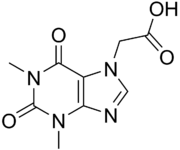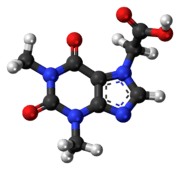Acefylline
 | |
 | |
| Clinical data | |
|---|---|
| ATC code | R03DA09 (WHO) (acefylline piperazine) |
| Identifiers | |
| |
| CAS Number |
652-37-9 |
| PubChem (CID) | 69550 |
| ChemSpider |
62754 |
| UNII |
M494UE2YEP |
| ChEMBL |
CHEMBL70246 |
| Chemical and physical data | |
| Formula | C9H10N4O4 |
| Molar mass | 238.20 g/mol |
| 3D model (Jmol) | Interactive image |
| |
| |
| | |
Acefylline, also known as acetyloxytheophylline, is a stimulant drug of the xanthine chemical class. It acts as an adenosine receptor antagonist. It is combined with diphenhydramine in the pharmaceutical preparation etanautine to help offset its stimulant effects.[1]
Theophyllines are classified in this group. Other respiratory stimulants are classified in R07AB - Respiratory stimulants.
Corticosteroids for systemic use, see H02.
Sympathomimetics for systemic treatment of rhinitis, see R01BA.
This group comprises mainly the xanthines. The DDDs for these substances are based on treatment of obstructive lung diseases.[2]
A number of preparations containing e.g. theophylline are classified in this group even if they do not have asthma as an indication.
Combinations of xanthines and other agents (except adrenergics, see R03DB - Xanthines and adrenergics) are classified at separate 5th levels using the corresponding 50-series (e.g. mucolytics).[3]
See also
References
- ↑ Zuidema, Jan. (1978). "Biofarmaceutische en farmacokinetische aspecten van theofylline en acefylline". Thesis (doctoral)--Universiteit van Amsterdam.
- ↑ http://www.whocc.no/atc_ddd_index/?code=R03DA09&showdescription=yes
- ↑ http://www.whocc.no/atc_ddd_index/?code=R03DA09&showdescription=yes